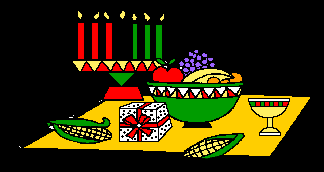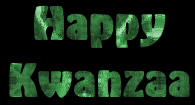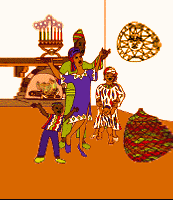 |
| Happy Three kings days greeting cards |
Printable coloring pages for kids and adults, worksheets for kindergarten kids, preschoolers and low grades on many different topics, games and exercises on many subjects, mandalas, hobbies, gifts, greeting cards, animations and glitters, health and good life tips, beautiful and moving stories and sentences.
Three Kings Day- January 6
Kwanzaa - 26 December
Kwanzaa is a secular holiday celebrated among African-Americans in the US, as of December 26, for a week, until January 1.
Holiday Kwanzaa reminds me a little Hanukkah , because of the custom of lighting the menorah candles with seven branches called Kinara, which begins with the lighting of a candle each and every day after lighting another candle. Holiday Kwanzaa is a modern holiday invented by Dr. Ron Maulana Carnegie in 1966 to honor and respect the cultural heritage of the United States from Africa. Customs of the holiday are: home decoration objects of arts, traditional African clothing, gift giving and fresh fruit. Before dinner revelers welcome cup of wine and passed it to them, including children. Kinara candle-lighting ceremony, an artistic performance and finally dinner. Blessing of the holiday is "Happy Kwanzaa feast" or "Habari Gani" (What's new in Swahili) or "Joyous Kwanzaa".
Festivus- December 23rd
 |
| Festivus Pole |
HumanLight - December 23rd
HumanLight Holiday is a secular holiday created in New Jersey in 2001 to provide a humanistic side to the Western world holiday season. The holiday is celebrated by many organizations and individuals across the United States and other countries.
The holiday focuses on secular positive human values, of intellect, compassion, humanity and hope.
The holiday has no fixed customs but it usually includes a shared meal among families or groups. Among many celebrants it is customary to light candles that symbolize reason, hope, compassion and humanity. It is also customary to do good deeds based on holiday values, such as charity work, gift exchange and other positive ideas related to holidays and celebrations.
While there are no strict requirements for holiday customs, there is also a slight flexibility in the date, but there is a wide range of themes and events that can be included in a HumanLight ceremony or celebration, such as "science book exchanges", music and activities for children. Charities and donations are also common parts of celebrations. Private home events tend to involve more diverse activities, but often include a meal with family and friends. The HumanLight Committee recommends maintaining three principles in each case: (1) promoting the positive values of humanism (2) avoiding negative messages related to religions (3) safeguarding the family and children.
HumanLight symbols
Everyone loves festive symbols, so over time the use of candles has become significant. Candles and ornaments in blue, red, and yellow/gold are commonly used to represent the colors of the HumanLight emblem, as well as wisdom, compassion, and hope. Three and four candles are usually lit, with the fourth candle representing humanity.
The HumanLight logo was created by a volunteer artist and contains three figures designed to reflect the “community character” of the holiday.
 |
| Source |
Many social organizations recognize the holiday of human light, including the American Humanist Association, which recognized it in 2004. The HumanLight Committee maintains an official holiday website and operates humanist organizations and media regarding the holiday.
The name HumanLight comes to emphasize that it is not a holiday based on something supernatural, but on the "light" in humanity that illuminates human reason.
December 23rd allows the HumanLight holiday to connect to the December holiday season without interfering with the other vacations to which many secular humanists go. The holiday is not meant to harm the religious Christmas, but to take place alongside it.
Sources of the HumanLight
The holiday began when in the late 1990s members of the New Jersey Humanist Network asked themselves how secularists could best participate in the December religious holiday season which includes Christmas and other special days that are sacred to Christians. They held a swearing-in event at the Verona Park Boat Club in Verona, New Jersey on December 23, 2001 attended by nearly 100 people, including the famous humanist Paul Kurtz.
From the time the holiday celebration expanded until 2010 there were at least 30 well-known public celebrations of many secular organizations, and of the American Humanist Association that approved the holiday. Over the years they began to perform ceremonies, meals and art performances and other activities.
How to celebrate HumanLight?
Because the holiday is not a religious holiday but a secular one, it is basically universal and anyone all around the world can celebrate it with a family meal and good deeds.















